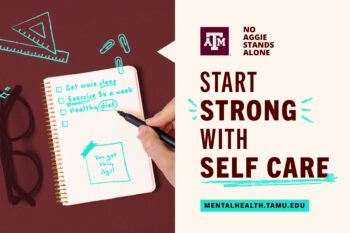How To Get A Healthy Start To The New Semester

Whether they’re coming back to campus feeling recharged from winter break or hoping for a fresh start after the fall semester, the beginning of a new year is a good time for students to set new goals. Focusing on healthy habits that prioritize mental health is key to attaining those goals, said Chanel Hicks, licensed professional counselor at University Health Services.
“I like reminding students that our attitude is everything, and if we come at our goals from a positive attitude of compassion and curiosity, it will benefit our mental health as we work toward the expectations we’ve set up for ourselves,” she said. “Our mental health is extremely important for us to be aware of how we’re showing up and approaching the goals we want to reach.”
Prioritizing mental health is a goal of Texas A&M University’s “No Aggie Stands Alone” campaign. With that in mind, Texas A&M Today asked Hicks for her advice to students for setting and maintaining healthy habits this semester.
Setting Goals
First, Hicks recommends students spend some time in a “planning phase” with their goals. During this time, they should think about not only what they want to accomplish, but how to feasibly make it happen. How much time will it require? Will they need to first learn any new skills? With fitness goals, for example, will they need any new equipment or clothes?
Hicks also recommends students write down what they want to achieve and find a visual representation of their end goals.
Get More Sleep
Sleep is critical to achieving any goals, Hicks said, as well as overall wellbeing.
“We need sleep to process our emotions throughout the day. It helps with our immune system, it helps with our attitude, and focusing on our sleep hygiene can work wonders on our mental health,” Hicks said.
A good night’s sleep helps us approach problems with a new perspective, and sometimes stress can be relieved with something as simple as a nap.
“We can’t ignore that focusing on our physical health has a direct correlation with our mental health,” Hicks said.
Check In On Yourself
Taking a few minutes every day to check in with themselves is another helpful habit for students to pick up, Hicks said: “Ask yourself, ‘How am I managing my stress? How am I managing my anxiety, and do I have any feelings of loneliness or depression? Do I feel connected to other people?’”
Physical health should also be considered during these check-ins. Ask questions such as, “Am I rested? What have I eaten recently, and how did it make me feel? Did it help my attitude or give me energy?”
Hicks also recommends students try to get into the practice of evaluating how they’re handling stress.
“We have good stress and bad stress in our lives, but we want to make sure we’re channeling it into something constructive or productive, rather than toxic or deflating,” she said. “One thing to remember about anxiety is that if it’s related to a real problem, there will be a real solution. Ask yourself if the stress is in proportion to whatever is going on.”
Rethink Your Screen Time
Hicks often hears from students that they want to reduce the amount of time they spend on their phones. An attainable goal in this area would be to try to avoid looking at social media before bed and for at least an hour after waking up.
“If looking at social media at night helps you relax, plan out something else to do, like reading a book or following a skincare routine,” Hicks said. “You can also invest in an inexpensive alarm clock for your room so that your phone doesn’t have to be within arm’s reach at bedtime.”
Students should ask themselves how social media is affecting their mental health and quality of life, she said.
“Comparison is the thief of all happiness, so if comparing ourselves is something that’s really deflating us, it’s not going to be what we want to put in our body and mind right before bed and waking up,” Hicks said.
Connect With Those Around You
Evaluating your support system and thinking about who is “filling your cup” is also beneficial, Hicks said, because it both creates a sense of belonging and helps you stay motivated.
Having a friend working toward the same goal as you or even just cheering you on from the sidelines can help fuel your momentum.
“Oftentimes the more we share with people, the more we’ll have a sense of pressure to stay accountable,” she said.
Making New Habits Stick
Part of building these healthy habits may need to involve some “white knuckling” at first, explains Dr. Brian Anderson, a cognitive neuroscientist in Texas A&M’s Department of Psychological and Brain Sciences. Forcing yourself to consistently do what you’re resolved to do establishes a new pattern in the process.
Anderson offers the following advice on making new habits stick:
- Keep in mind that trying to convince yourself that a new habit is good or an existing habit is bad isn’t going to help. The part of your brain that knows whether something is good for you is different from the part that controls habits.
- You’ll hopefully start to feel the rewards of a healthy habit over time, which will help reinforce the habit. “Repetitively responding in a particular way in a particular situation will carve out a tendency to a respond that way in the future, even if you never really feel the rewards.”
- To build a habit that is sustainable, make it specific and realistic. Rather than simply trying to exercise more, or for one hour every day, he recommends a goal more along the lines of “complete 30 minutes of cardio three times a week,” ideally with some specificity concerning when that will happen.
- Consistency is key, especially early-on. Anderson said the goal is to never cheat. “Every time you act contrary to the habit you want to build and fall back into what you’re used to doing, you reinforce or ‘feed’ that old habit. That doesn’t mean all is lost if you do slip here and there, but your goal should be to ‘starve out’ that old habit. If you can resolve yourself to aggressively starve out that old habit for at least a couple of months, it can make a real difference in building a new pattern.”
Resources
The University Health Services website offers resources for students to learn more about common concerns they may face, like anxiety, depression and grief, as well information on healthy habits they can incorporate into their daily routine, like journal writing and meditation.




